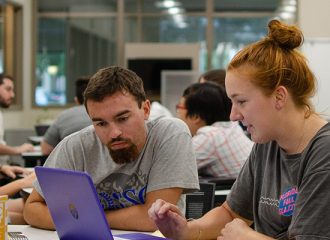By Kelly Driscoll
I wake up in my childhood bedroom. Around one hour and twelve minutes away is my college apartment with a calendar that still reads “Come Back from Spring Break,” which is a date I didn’t realize then wouldn’t happen for another six months. Rolling over to grab my phone for a light morning scroll, I see an email reading *UCF ALERT*. The University Writing Center (UWC), where I’m currently a peer tutor, forwarded a message from UCF. I learned the university would be conducting classes remotely for two weeks to minimize the health risks related to the coronavirus (COVID-19). It was bold to think it would only be for two weeks.
The UWC quickly worked to find a way to continue offering students writing center consultations during a time when they needed support the most. From our directors, all the way down to us tutors, we needed to adapt. Uncertainty became a constant in our lives both at work and at home. It was, and continues to be, vital that we work together to find the best solutions to support our writers and each other.
What’s Zoom?
“You will need to demonstrate that you are ready to tutor via Zoom,” Mariana Chao, Coordinator for the UWC, wrote in an email. Oh, God. What’s Zoom?
Zoom, an online video conferencing platform, has been our lifeline at the UWC. It’s how we’ve been able to stay connected, formed relationships, and worked in the midst of a pandemic. Some tutors were specifically trained to conduct online consultations using an old program before leaving for the world’s longest spring break. But now, everyone has adapted to a whole new routine with Zoom.
Mariana and the UWC directors were there to show us our new reality as writing center tutors in the age of COVID-19. We were responsible for new tasks during our sessions. Sending writers an email with our Zoom link, logging them in and out of their session, and dealing with new technical difficulties were all added to our responsibilities. It was an adjustment. However, peer tutors went beyond their weekly meetings to make sure everyone was on the same page.
At the beginning of corona-life, our UWC Slack message board had texts from tutors asking if anyone could get on a Zoom call with them to explain how to do something. Almost immediately, there was another tutor joining their meeting room. Together, they would figure out whatever issue there was and discuss how that problem might affect a consultation. Questions about solving technical issues or not understanding how to do something were greatly welcomed by all tutors. Nobody was judged for not knowing how to do something like sharing their screen or annotating. Rather, other tutors gave them the time and support they needed to be ready to welcome writers to their Zoom rooms.
The New Kids on the Block
If we weren’t tutoring in-person for the fall, there was a new issue that had to be addressed, onboarding a new batch of peer tutors to an online writing center. An orientation usually takes place the week before school starts to assist new tutors through the procedures of the writing center. Most of the previous materials used during orientation were rendered useless now that we were going virtual.
So, tutors got to work.
During the summer months, special committees were created in order to figure out ways to welcome new tutors to an unfamiliar UWC. In tandem with UWC directors, the orientation committee planned out the itinerary and activities for the virtual orientation, and a video committee was tasked to create tutorials for online tutoring. Even further, tutors proposed the idea of starting mentorship groups with the newcomers.
One of the hardest aspects of going virtual was forming new friendships. Countless times I’ve heard my fellow veteran tutors say that what they miss the most about being in-person was the break room at the UWC. Backpacks used to litter the floor while tutors squished in tight on the couches getting the chance to know one another. Whether in-between sessions or just stopping in to say hi, the break room was a place of belonging. To try and recreate some of this experience, veteran tutors were matched into mentorship groups to help make the new tutors feel welcomed.
“I’ve had a great experience with my mentors so far. [My mentors] both create engaging conversations that allow everyone in the group to openly discuss any questions they have,” says Mekenzie McElroy, a new Fall 2020 UWC tutor.
“I think getting situated as a new tutor in this online environment would be so much harder if we didn’t have the mentorship program.”
These mentorship groups have also helped me in still feeling the strong bond of the UWC community. We have the chance to talk about our tutoring styles and answer questions, but beyond that, my mentorship group cares about each other outside of talking about tutoring. We ask about our personal writing and encourage everyone to strive to be the best tutor, student, and person we can be.
Leia Silva, another veteran tutor at the writing center, has also enjoyed the time with her mentorship group. Being away from the physical writing center has been a challenge for many reasons, but for Silva, the formation of relationships between veterans and new tutors has been the hardest to replicate virtually. However, she’s found authentic and meaningful connections through her mentorship group. Though the initial reason for these groups was to help answer new tutors’ questions about the writing center and assist them in tutoring for the first time, Silva found something more.
“It’s an emotional support group,” she says. “If I let them know I’m feeling stressed, then [the new tutors] will open up about feeling stressed, too.”
Silva has been able to bond over more than just writing center work. Tutors at the UWC have strived to make deep connections during a time when everyone is isolated from each other.
It’s More Than a Job
UWC veteran tutors are required to attend a weekly seminar to continue writing center study. While this semester has been filled with great conversations, the last day of seminar was the one of the best classes we’ve had this fall. Our assignment was to identify our top two personal values and explain our choices. The discussion board was filled with words like “love,” “diversity,” and “belonging.” In class, we were given the opportunity to discuss how we felt about the assignment.
Suddenly, that day’s seminar became therapy.
Tutor after tutor took the floor to express how this assignment was a therapeutic experience and explained self-discoveries they had made while completing it. Nods of support rippled throughout the Zoom call and compliments to each other kept popping up in the chat. Every time two people talked at once, there was a chorus of “No, you go!” There is no division between who we are as tutors and who we are as people.
“The support of everyone and the flexibility when moving remote has been so helpful in such stressful times. I’ve had sessions with [other tutors] and they have helped me so much, not only with my assignments, but also with the stress I might feel at the time,” says Marhian Mejias, another veteran tutor at the UWC. “This feels like more than a job.”
The UWC is a place of acceptance and understanding. There will always be someone in your corner cheering you on. Tutors created a space for vulnerability and listened to each other during the last seminar. I know the current tutors and staff at the writing center are constantly working to embed these same ideals into every aspect of our practices.
The Heart of the UWC
A couple of months ago, I was one hour and twelve minutes away from a place that was no longer filled with the sounds of pens scribbling on notepads, computer keys rapidly clicking away, or laughter filtering out from the break room. Behind the big windows in Trevor Colbourn Hall was darkness. However, the spirit of the University Writing Center is living on in Slack messages, Zoom meetings, and GroupMe chats. Tutors have gone above and beyond to support one another through these huge changes. The UWC community supports our journey as writing center tutors by creating a safe environment to learn and grow. It’s been easy to feel alone during the coronavirus pandemic, but being at the UWC has given me a community of people who truly care for the work they do and the people they work with. Behind the scenes of a forty-five-minute Zoom consultation are students building friendships, discussing writing center theory, and trying their best to make the UWC environment one of inclusiveness. The University Writing Center is not a just a place to improve your writing; it’s a collective of diverse people building a support system for the UCF community.




